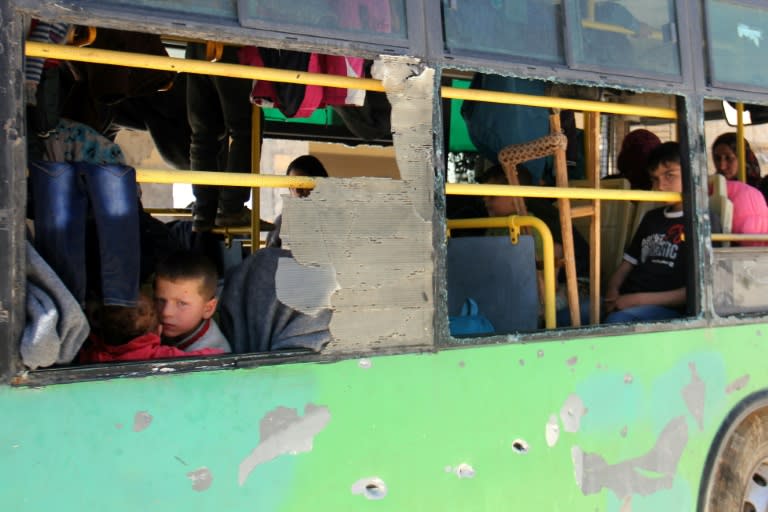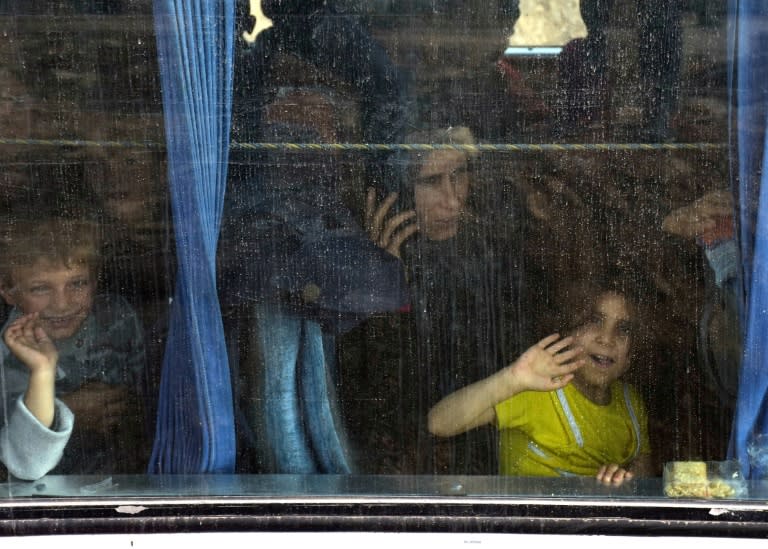Syria evacuees on move again after 48-hour delay
Thousands of evacuees from besieged Syrian towns reached their destinations Friday after a delay that left some stuck for 48 hours at the site of a devastating bomb attack. Villagers from government-held Fuaa and Kafraya arrived in Aleppo province, travelling on 45 buses, after waiting two days at a marshalling point in rebel-held Rashidin, the Syrian Observatory for Human Rights said. They had waited under the guard of dozens of rebels seeking to head off another attack. All 11 buses evacuating civilians and fighters from Zabadani and two other rebel-held areas around Damascus meanwhile crossed into opposition-held Idlib province, the Britain-based Observatory said. A total of 3,000 evacuees left their homes in Fuaa and Kafraya at dawn on Wednesday as part of a deal under which residents and fighters are also being evacuated from rebel-held areas surrounded by government forces. But the evacuees were forced to spend two nights on buses at the marshalling area after last-minute disagreement over the release of prisoners held by President Bashar al-Assad's government. "After all the buses have left, 750 prisoners will be freed. God willing, this question will be resolved," Abu Obeida, a rebel official overseeing the operation, told AFP in Rashidin. The head of the Observatory said a first batch of 50 prisoners, including at least 15 women, were released from regime prisons and arrived in Rashidin. Rami Abdel Rahman said the remainder would be freed, in groups, over the next 24 hours and given the choice to stay in regime-controlled areas or head to rebel-held territory. The evacuations began last week but were delayed after Saturday's suicide car bombing killed 150 people, 72 of them children, at the transit point in Rashidin. The toll in the bombing had previously been given as 126, but the Observatory on Friday said more people wounded in the attack had died. - Assad accuses ex-Al-Qaeda group - Saturday's attack was one of the deadliest since Syria's six-year civil war began, and was widely denounced for targeting civilians. "Someone pretending even to distribute aid and attracting the children produced that horrific explosion," UN Syria envoy Staffan de Mistura said on Thursday. Witnesses said a vehicle distributing bags of crisps to children exploded near the buses transporting the evacuees. In an interview with Russia's RIA Novosti news agency published on Friday, Assad blamed the former Al-Qaeda affiliate now known as Fateh al-Sham Front. "It was Jabhat al-Nusra, they haven't hidden it from the very start, and I think that everyone agrees that it was Nusra," he said, using the group's former name. No one has claimed responsibility for the attack, which was condemned by Syria's political opposition and the powerful Ahrar al-Sham rebel group. The evacuations mark the end of the first stage of a deal brokered by regime ally Iran and Qatar, a longtime supporter of Syrian rebel groups. The deal also involved the release of a Qatari hunting party kidnapped in southern Iraq in 2015, according to sources in Baghdad. All 26 of the hunters -- believed to include prominent members of the Qatari royal family -- have been freed and were being handed over to a Qatari delegation in Baghdad on Friday, a senior Iraqi official told AFP. There was never any claim for the kidnapping of the hunters who were seized in a Shiite area of Iraq and widely believed to have been abducted by militias with close ties to Tehran. When the current phase of Syrian evacuations is complete, a total of 8,000 people should have left Fuaa and Kafraya in exchange for 2,500 civilians and rebels from opposition areas. A second phase is due to begin in June. Assad's regime has presented evacuation deals as the best way to end Syria's war, which has killed more than 320,000 people and forced more than half the population from their homes. The opposition says the evacuations amount to forced relocation after years of bombardment and siege. The UN is not involved, and the head of its humanitarian taskforce for Syria, Jan Egeland, said such deals were "spurred by military logic not by humanitarian principles".





